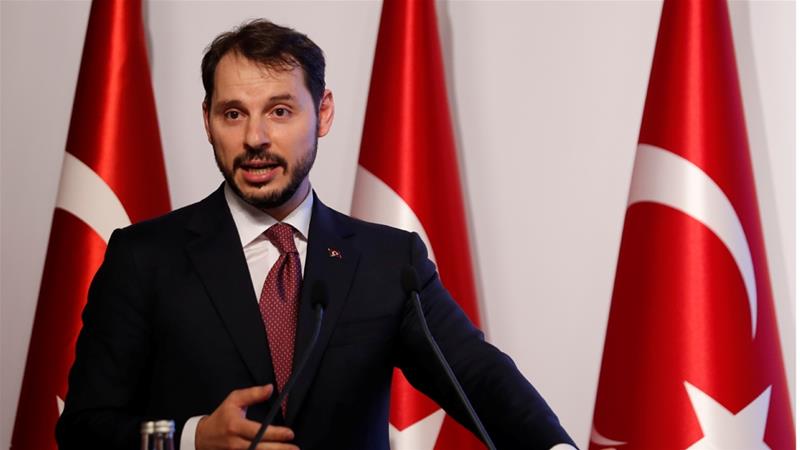Turkey's central bank launches economic-stability plan

Turkey's central bank on Monday announced it was taking all necessary measures to ensure financial stability after the collapse of the lira, promising to provide "all the liquidity the banks need".
The Turkish currency reached a new record low of 7.24 against the US dollar in Asia Pacific trade when markets opened on Monday morning. The lira pared some of its losses after the central bank's announcement, but it was still down more than seven percent on the day.
The currency has lost more than 45 percent of its value this year.
Worries about President Recep Tayyip Erdogan's influence over the economy, including his repeated calls for low interest rates in the face of high inflation, and Turkey's worsening ties with the United States have contributed to the steep decline.
"The central bank will closely monitor the market depth and price formations, and take all necessary measures to maintain financial stability, if deemed necessary," the bank said in a statement.
Investors fear the lira's sell-off could have a ripple effect in global financial markets with the euro, the South African rand, and Mexico's peso already dented by Turkey's crisis.
"Clearly Turkey's situation is another global risk," said Konstantinos Anthis, head of research at ADS Securities.
Erdogan says Turkey economy under attack as Trump doubles tariffs
"Even though the country itself has limited ties with the rest of the world, a spreading of the crisis to Europe via its banks' exposure is a major concern."
Economic warfare
In an interview with the Hurriyet online newspaper on Sunday, Finance Minister Berat Albayrak described the lira's downfall as "an attack", echoing recent comments by Erdogan.
Turkey's interior ministry said on Monday it was taking necessary legal measures against social media posts regarding the dollar exchange rate that create a negative perception of the economy .
It said 346 social media accounts that posted comments about the weakening of the lira "in a provocative way" have been identified since August 7 and legal action has been launched.
Albayrak said a plan was prepared for banks and the real-economy sector, including small to mid-sized businesses, which are among those most affected by the foreign exchange fluctuations.
"We will be taking the necessary steps with our banks and banking watchdog in a speedy manner," he said.
Albayrak dismissed any suggestions that Turkey might intervene in dollar-denominated bank accounts, saying any seizure or conversion of those deposits into lira was out of the question.
Eugene Leow of DBS Group said in a report worries are building the situation in Turkey "may lead to contagion" across emerging markets.
"Turkey's financial crisis has taken centre stage, displacing trade wars as the immediate concern. We fail to see how the crisis can be resolved without external support," said Leow.
'Enemy of interest rates'
Erdogan has stood by his opposition to high interest rates, calling them an instrument of exploitation and dubbing himself the "enemy of interest rates".
Instead, he is looking to Turkey's banks to provide cheap credit to drive growth, but investors fear the economy is overheating
Erdogan's comments on interest rates, along with his recent appointment of his son in law, Albayrak, as finance minister have intensified concerns the central bank is not independent.
Speaking to supporters in Trabzon on Turkey's Black Sea coast on Sunday, the president dismissed suggestions that Turkey was in a financial crisis like those seen in Asia two decades ago.
He said the fall in the lira was caused by a plot and did not reflect the country's economic state.
"What is the reason for all this storm in a tea cup? There is no economic reason ... This is called carrying out an operation against Turkey," he said.
In May, the central bank raised interest rates to support the lira in an emergency move, but it did not tighten monetary policy at its last meeting.
Diplomatic row with US
Erdogan has repeated calls for Turks to sell dollars and buy lira to shore up the currency, while also telling business owners not to stock up on dollars.
"I am specifically addressing our manufacturers: Do not rush to the banks to buy dollars. Do not take a stance saying 'We are bankrupt, we are done, we should guarantee ourselves'. If you do that, that would be wrong. You should know that to keep this nation standing ... is the manufacturers' duty."
Turkey's row with the US has put even more pressure on the lira.
The two NATO allies have been at odds over several issues including, diverging interests in Syria, Ankara's plans to buy Russian defence systems and, most recently, the case of an evangelical pastor on trial in Turkey.
Andrew Brunson had been in jail for almost 20 months, when a court in July ordered him to be moved to house arrest. Since then, US President Donald Trump and his Vice President Mike Pence have called for Brunson's release, while Ankara says the decision is up to the courts.
In response, Washington sanctioned two Turkish ministers and Trump announced on Friday the US would double tariffs on steel and aluminium imports from Turkey, saying relations with the country were "not good at this time".
Last week, a Turkish delegation travelled to Washington to meet US counterparts, but there was no apparent breakthrough.
On Sunday, Erdogan said the US had given Turkey until last Wednesday to hand Brunson over or face sanctions.
A White House official later contradicted the claims that a deadline was sent, adding they expected Brunson to be sent home a long time ago but diplomatic efforts to find a solution are ongoing.